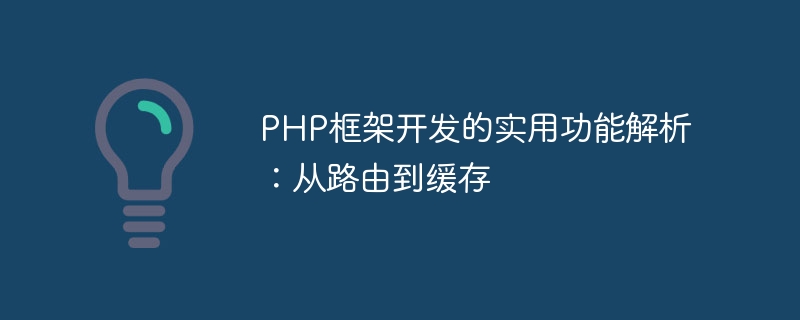Home >Backend Development >PHP Tutorial >Analysis of practical functions for PHP framework development: from routing to caching
Analysis of practical functions for PHP framework development: from routing to caching
- PHPzOriginal
- 2023-11-27 11:51:291458browse

Analysis of practical functions for PHP framework development: from routing to caching
As the complexity of web applications continues to increase, developers increasingly need to be efficient and fast tools to simplify the development process. The PHP framework is widely used to meet such needs. In this article, we will focus on two practical features in PHP framework development: routing and caching.
1. Routing
Routing is an integral part of Web applications. It is responsible for mapping user requests to corresponding handlers or controllers. Without a framework, we usually need to manually write routing logic to parse and distribute URLs. However, the PHP framework provides a more concise and flexible way to handle routing functionality.
The PHP framework usually provides a routing table configuration file, and we can customize routing rules as needed. Through the definition of routing rules, the framework will automatically map the URL requested by the user to the corresponding controller and method. In this way, we can use object-oriented methods to handle different business logic and improve development efficiency.
In addition, the PHP framework also provides the function of routing parameters. By defining parameters in routing rules, we can easily extract the required parameter values from the URL and pass them to the corresponding processing method. In this way, we can handle user requests more flexibly and execute different logic based on different parameters.
2. Caching
Caching is one of the important means to improve the performance of Web applications. In PHP framework development, the framework usually provides multiple caching mechanisms to meet the needs of different scenarios. Below we will introduce two commonly used caching methods: page caching and data caching.
- Page caching
Page caching stores the processed page content in the cache so that subsequent requests can be read directly from the cache to improve the loading speed of the page. In the framework, we can enable page caching through configuration files or code. Once enabled, the framework automatically saves the page content in the cache server and returns the cached page content directly on the next request without the need for regeneration. - Data caching
Data caching is to save database query results, generated HTML fragments and other data in the cache so that subsequent requests can directly obtain these data and reduce the time of database query or processing. The PHP framework usually provides corresponding APIs to operate data caching. We can store the data that needs to be cached in memory or other efficient storage media to improve the data reading speed.
The cache validity period is an issue that we need to pay special attention to. In order to avoid data inconsistency problems caused by cached data expiration or too long expiration time, we can set an appropriate cache expiration time in the framework to ensure the real-time nature of cached data.
To sum up, routing and caching are very practical functions in PHP framework development. Through the routing function provided by the framework, we can handle user requests more flexibly and improve development efficiency. By using the caching function, we can reduce the load on the database and server and improve the response speed. With the continuous development of web applications, the functions of the PHP framework will continue to be improved and enhanced, providing developers with a more convenient and efficient development method. I hope this article can inspire readers and enable them to better use routing and caching functions in PHP framework development.
The above is the detailed content of Analysis of practical functions for PHP framework development: from routing to caching. For more information, please follow other related articles on the PHP Chinese website!

